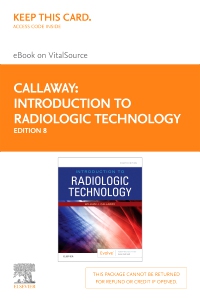
Introduction to Radiologic Technology - Elsevier eBook on VitalSource (Retail Access Card), 8th Edition
Elsevier eBook on VitalSource - Access Card

Introduce your students to the radiologic technology profession with this solid text! Covering everything a beginning radiography student needs to know, Introduction to Radiologic Technology, 8th Edition lays the groundwork for a successful career. It includes coverage of the coursework required, basic learning skills, a historical perspective on radiology, and insight into key topics such as the language of medicine, digital imaging, patient interactions, and radiation safety. This book also includes a discussion of the radiographer’s role in the practice setting and opportunities for advancement.
-
- Thorough introduction to radiologic technology includes a concise overview of what students can expect in their coursework
- Guidelines for a solid radiography career foundation discuss customer service, ethics and professionalism, and professional organizations
- A clear, easy-to-read style does not assume prior knowledge of the subject matter.
- NEW! Incorporation of SI units of measurement accurately depict current practice standards
- NEW! Updated career advancement opportunities and newest medical terminology include just the right amount detail for new radiographers
- Critical thinking skills are highlighted, with four important steps to take in assessing situations and making informed decisions
- Cultural diversity coverage orients students to the challenge of dealing with patients from different cultures in the medical environment
-
- NEW! Updated career advancement opportunities and newest medical terminology include just the right amount detail for new radiographers
- NEW! Incorporation of SI units of measurement accurately depict current practice standards
-
Part I: Becoming a Radiologic Technologist
1. Radiography Education: From Classroom to Clinic
2. Becoming an Outstanding Student
3. Evolution of Health Care Delivery
4. Radiology: A Historic Perspective
Part II: Practicing the Profession
5. Orientation to Patient Care
6. Providing Quality Patient Service
7. The Language of Medicine
8. The Technology of Medical Imaging
9. Imaging Examinations: Diagnosing Disease and Injury
10. Radiation Protection
11. Ethics, Professionalism, and Law in Radiologic Technology
12. Organization and Operation of the Radiology Department
13. Health Professions
Part III: Growing with the Profession
14.The American Registry of Radiologic Technologists
15. Professional Associations
16. Clinical Specialization and Professional Advancement


 as described in our
as described in our 